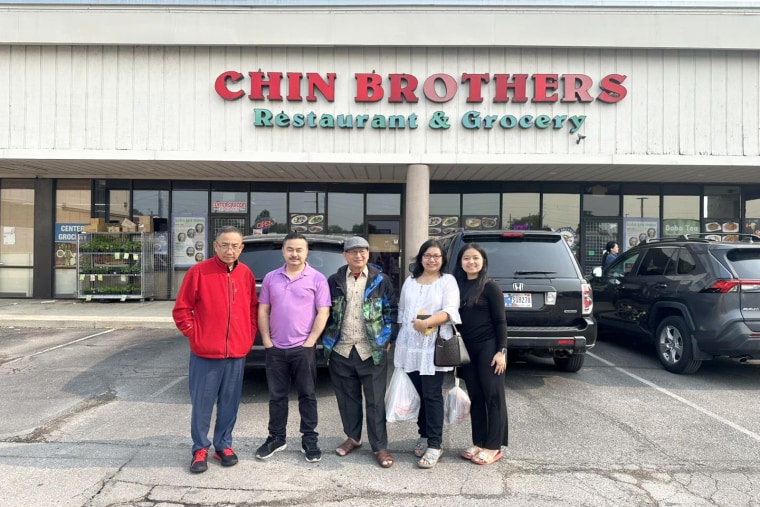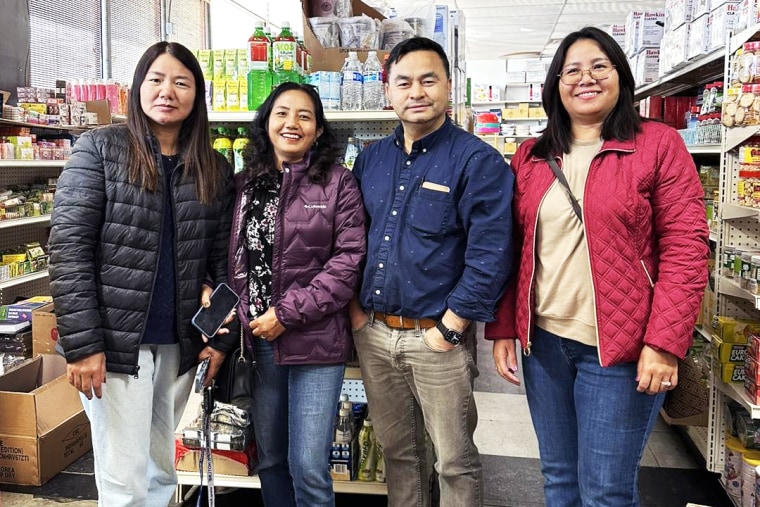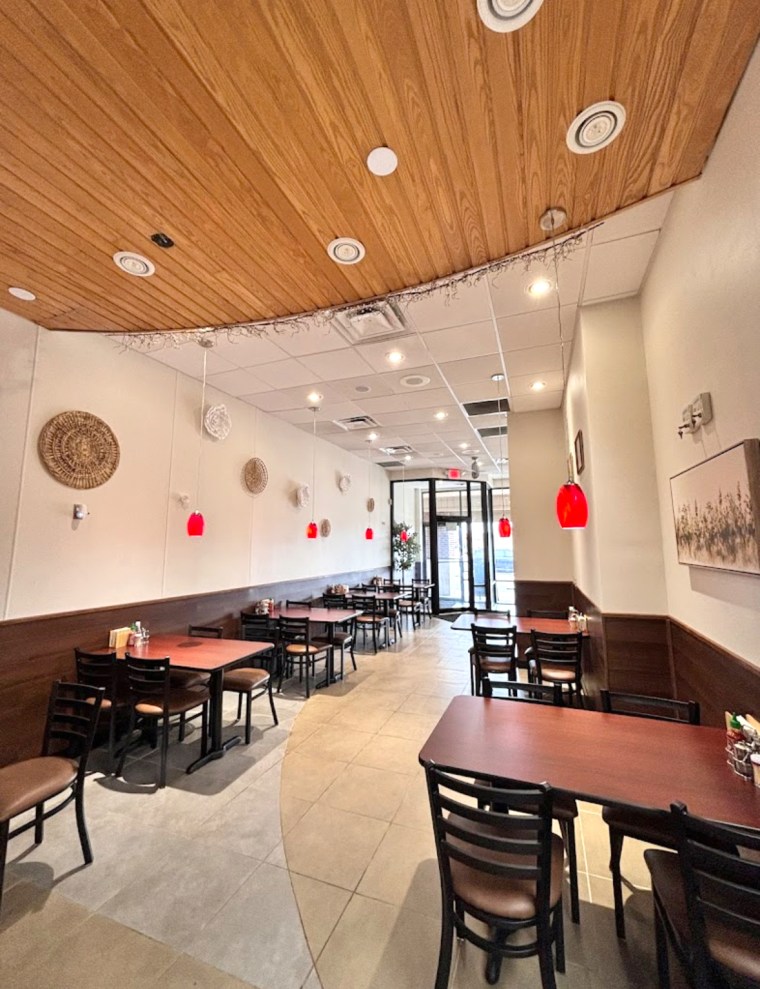In Indianapolis, Than Hre, the Burmese-born proprietor of Chin Brothers Restaurant & Grocery, stands behind his counter tallying receipts that inform the story of a enterprise underneath strain.
Over the previous 12 months, he says, the revenue margin for his restaurant and grocery enterprise has dropped from round 35% to about 10% as tariffs and delivery prices have pushed up the worth of rice and Burmese staples by as a lot as 40%.
The identical is true for quite a few different companies in Indianapolis, town with the biggest Burmese neighborhood in the USA, at 30,000 folks, in response to the Burmese American Group Institute.
Tariffs on importing Myanmar items have risen to 45%, driving up the price of staples like rice and spices and creating important challenges for Burmese companies throughout the USA.
“It’s exhausting as a result of we can not enhance the costs, but if we do, we’re going to lose clients,” mentioned Hre, 48.

On prime of the tariff toll, it has been a wrestle for Burmese in the USA because the journey ban blocks practically all journey and immigration from Myanmar, halting household reunifications and scholar visas because the nation faces civil warfare and compelled conscription.
The emotional toll is compounded by the civil warfare in Myanmar, which has made communication with family practically unattainable due to frequent Wi-Fi blackouts and authorities crackdowns, in response to Tha Zi, proprietor of Mommy Thai, an Asian restaurant serving Burmese, Chinese language and Thai meals in a a small, family-run spot on the Southside of Indianapolis.
“Generally the Wi-Fi is lower off for days,” Zi mentioned, making it practically unattainable to verify whether or not her family are secure. She mentioned that her cousin was supposed to come back to the USA for school however that the brand new journey ban means her visa was denied and he or she’s now caught in Myanmar. Tales like theirs echo throughout the neighborhood as households fear about family members going through compelled navy conscription, bombings and the uncertainty of warfare — all whereas making an attempt to maintain their companies afloat in Indiana.
To assist get well earnings, Hre has in the reduction of on stock, and he orders product conservatively — by field now, as a substitute of pallet. He doesn’t want to chop again on employees as he depends on his three sons and spouse to maintain the household enterprise afloat, joking that he pays them in additional Burmese meals.

Most Burmese households arrived in the USA as refugees, fleeing harsh navy rule, ethnic persecution and ongoing civil warfare in Myanmar. The primary wave got here after the 1962 navy coup and continued via the Eighties and the Nineteen Nineties, however the largest inflow started within the mid-2000s because the U.S. Refugee Resettlement Program prioritized these escaping spiritual and ethnic violence, particularly among the many Chin, Karen and Rohingya minorities.
Inexpensive housing, job alternatives like manufacturing unit work and a robust community of Christian church buildings made Indianapolis particularly enticing for Chin and different ethnic minorities. As extra Burmese settled within the metropolis, secondary migration adopted — new arrivals and even refugees initially positioned in different states moved to Indianapolis to hitch household and mates and profit from the established neighborhood and assist techniques.
At Mommy Thai, Zi, the proprietor, describes how rising prices for meat and genuine noodles have made it troublesome to maintain the doorways open, though most of her elements are sourced domestically. “The value of meat is admittedly excessive, and the noodles that we use for genuine dishes, the worth has gone up quite a bit due to tariffs and delivery,” she mentioned.

Zi tries to not elevate costs an excessive amount of, realizing her buyer base is usually households and college students, however it’s getting exhausting to maintain up, she mentioned. She has needed to in the reduction of on specialty menu objects and watch as regulars go to much less continuously, a pattern echoed throughout the trade as a projected 7% dip in client restaurant spending hits small companies particularly exhausting.
Siam Sq., a mom-and-pop Thai restaurant in Indianapolis, can be feeling the pressure of the tariffs and the journey ban.
Whereas the journey ban doesn’t immediately goal Thailand, proprietor Ed Rudisell mentioned it nonetheless has a significant influence on his enterprise. About 70% of his employees are Burmese — primarily Chin refugees. The ban means folks don’t “have any hope of seeing household from Burma,” Rudisell mentioned, and it creates worry and pressure amongst employees members about their households again residence.
Rudisell has watched the price of important elements like garlic practically double — from $56 to $93 a case — forcing him to boost menu costs twice since January.
“Meals prices have gone via the roof,” Rudisell mentioned. However he’d slightly elevate costs than scale back portion sizes or compromise on high quality, as clients count on consistency, he mentioned.
Typically, importers elevate their ingredient costs earlier than the tariffs are formally lively, Rudisell mentioned.
“The harm is completed,” he mentioned. “By that time, we’ve already paid the elevated payments.”
Zi mentioned the journey ban and the tariffs, meant to handle safety and commerce considerations, as a substitute deepen the challenges going through Burmese-Chin households fleeing violence, instability and financial hardship.
The ban suspends each immigrant and nonimmigrant visas for Myanmar nationals, squandering hope for reunification or academic alternatives, Zi mentioned.
“My cousin was supposed to come back right here for school, however now with the journey ban, her visa was denied and he or she’s caught in Burma,” she mentioned.
Rudisell added, “To lock it down and say no one else is allowed to come back in is totally inhumane.”

